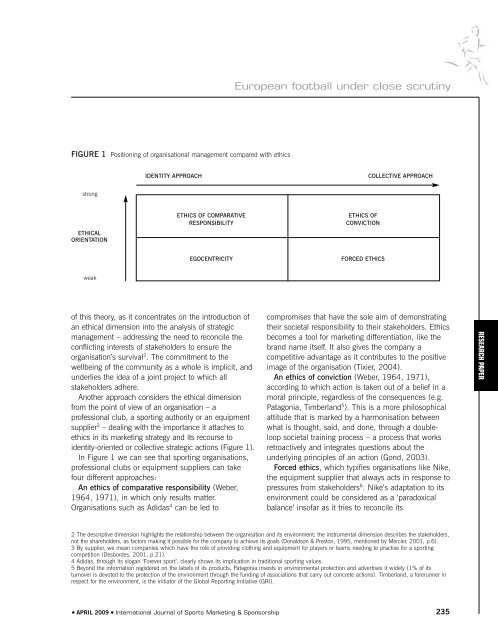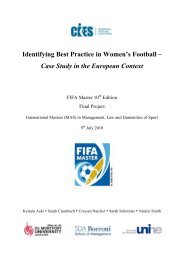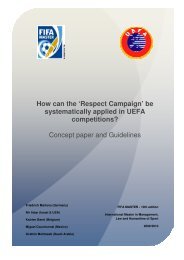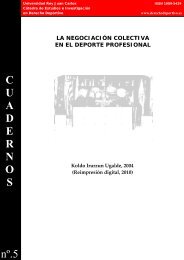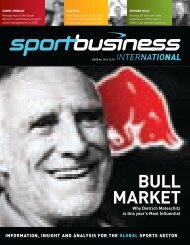European football under close scrutinyFIGURE 1 Positioning of organisational management compared with ethicsIDENTITY APPROACHCOLLECTIVE APPROACHstrongETHICALORIENTATIONETHICS OF COMPARATIVERESPONSIBILITYETHICS OFCONVICTIONEGOCENTRICITYFORCED ETHICSweakof this theory, as it concentrates on the introduction ofan ethical dimension into the analysis of strategicmanagement – addressing the need to reconcile theconflicting interests of stakeholders to ensure theorganisation’s survival 2 . The commitment to thewellbeing of the community as a whole is implicit, andunderlies the idea of a joint project to which allstakeholders adhere.Another approach considers the ethical dimensionfrom the point of view of an organisation – aprofessional club, a sporting authority or an equipmentsupplier 3 – dealing with the importance it attaches toethics in its marketing strategy and its recourse toidentity-oriented or collective strategic actions (Figure 1).In Figure 1 we can see that sporting organisations,professional clubs or equipment suppliers can takefour different approaches:An ethics of comparative responsibility (Weber,1964, 1971), in which only results matter.Organisations such as Adidas 4 can be led tocompromises that have the sole aim of demonstratingtheir societal responsibility to their stakeholders. Ethicsbecomes a tool for marketing differentiation, like thebrand name itself. It also gives the company acompetitive advantage as it contributes to the positiveimage of the organisation (Tixier, 2004).An ethics of conviction (Weber, 1964, 1971),according to which action is taken out of a belief in amoral principle, regardless of the consequences (e.g.Patagonia, Timberland 5 ). This is a more philosophicalattitude that is marked by a harmonisation betweenwhat is thought, said, and done, through a doubleloopsocietal training process – a process that worksretroactively and integrates questions about theunderlying principles of an action (Gond, 2003).Forced ethics, which typifies organisations like Nike,the equipment supplier that always acts in response topressures from stakeholders 6 . Nike’s adaptation to itsenvironment could be considered as a ‘paradoxicalbalance’ insofar as it tries to reconcile itsRESEARCH PAPER2 The descriptive dimension highlights the relationship between the organisation and its environment; the instrumental dimension describes the stakeholders,not the shareholders, as factors making it possible for the company to achieve its goals (Donaldson & Preston, 1995, mentioned by Mercier, 2001, p.6).3 By supplier, we mean companies which have the role of providing clothing and equipment for players or teams needing to practise for a sportingcompetition (Desbordes, 2001, p.21).4 Adidas, through its slogan ‘Forever sport’, clearly shows its implication in traditional sporting values.5 Beyond the information registered on the labels of its products, Patagonia invests in environmental protection and advertises it widely (1% of itsturnover is devoted to the protection of the environment through the funding of associations that carry out concrete actions). Timberland, a forerunner inrespect for the environment, is the initiator of the Global Reporting Initiative (GRI).● APRIL 2009 ● <strong>International</strong> Journal of <strong>Sports</strong> <strong>Marketing</strong> & <strong>Sponsorship</strong>235
European football under close scrutinyRESEARCH PAPERorganisational goal (profit) with the general interests ofsociety as a whole. Its appropriation of ethics iscomparable to a single-loop societal adjustmentprocess (Gond, 2003). A strategy of cooperationprevails over confrontations.Egocentricity or self-centeredness, which is theattitude of organisations that do not care much forethics (e.g. Puma). Their development is ensured bytheir inimitable competence, due to which they keep adefinite advantage over their competitors.Indeed, ethical positioning, with regard to marketingstrategy, can be analysed in two ways. These combineaspects that have to do with deliberate strategies andfall under a contingent logic. The pressure of theenvironment plays a major part in this. The followingsection attempts to measure the relative roles of thesetwo concepts in professional football.European football and ethics: ethics as a majorelement in marketingThe integration of ethical considerations into sportingmanagement depends first on the commitment ofmanagers, who set the tone of the organisation’sgeneral policy (Mercier, 1999). Making their ethicalcommitment credible is a challenge for organisations,and the stakes are very high. This has become a newbattleground for competition, much like ‘quality’ was afew years ago. Although “ethics” may appear to be anew management tool, its successful use relies onintense work on the group’s values (Mercier, 1999),because any disagreement will lead to sanctions fromhigher powers. Passing on information will be a keyfactor in the area of communication, and will dependon the stakeholders. Such a marketing choice givesthe organisation a better rating over its competitors(Pautard, 2004). After briefly examining the radicalcommercial shift that football has undergone, we willshow the respect this sporting sector has for ethics,through a study of a selection of actions. In line withthis, commercial repercussions on consumers andsponsors are emphasised.The shift of the 1980s: towards a form of capitalistbusiness?In many countries, football carries so much social andpolitical weight that it has become a political force innational or local governing bodies. The changesfootball has gone through over the last 10 years haveled to many observers considering it as an emergingindustry. The major evolution to less state economiccontrol and a general trend towards more privatisedstructures and globalised trade has significantlyaffected the sector of sporting event production, andfootball has been the first sport affected in terms ofaudience. The European clubs can thus be comparedto sporting event producers working in the field ofentertainment.The rise in the economic stakes involved in sportingevents since the 1980s, linked with the opportunity tosell broadcasting rights, has attracted many privateoperators interested in investing in the sector. Somehave developed in the direction of industrial strategy,like the media, sport-oriented public relations agenciesand equipment suppliers. Some, only a few in fact,are solely motivated by financial gain. Others seem tobe driven by a need to maximise their own socialefficiency: they subsidise clubs to satisfy their personalpassion and to secure a strong reputation through thestrong media presence in football.The political economy of professional football haschanged radically over recent years. Andreff (2000)summarises this transformation as the passage froman ‘SSSL’ (Spectators-Subsidies-Sponsors-Local) modelof subsidising, which was the rule in the 1970s, to an‘MMMMG’ (Media-Magnates-Merchandising-Markets-Global) model in the 1980s.One of the major goals of the operators in footballtoday is a commercial one. They seek to diversify and6 Nike sells a rebellious state of mind – a festive lifestyle – more than sporting products. When in 2001, non-governmental organisations blamed theequipment supplier for making children work in sweatshops, it was its speech about “blossoming”, “going beyond”, the “Just do it” slogan, and the socialideas associated with them, that were targeted (Levy, 2003). Nike’s response was to keep a tighter control on its subcontractors and to give subsidies to anon-governmental organisation, Global Alliance for Workers and Communities, in partnership with the World Bank and the Gap clothing brand. Even if thereports on the audits carried out among the subcontractors were not positive, the group is taking on its responsibility and is rebuilding its image step by step.236 <strong>International</strong> Journal of <strong>Sports</strong> <strong>Marketing</strong> & <strong>Sponsorship</strong> ● APRIL 2009 ●


